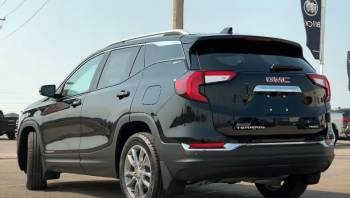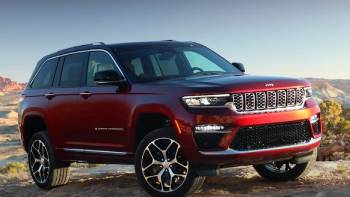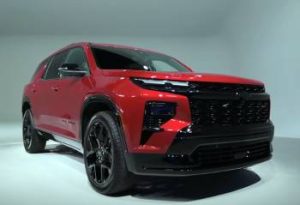The world of SUVs is a battleground of powerhouse contenders, each offering unique sets of features that appeal to different demographics of drivers. At the forefront of this competition lie two undeniably iconic names: the GMC Terrain and the Jeep Grand Cherokee. Both vehicles boast an admirable lineage and a dedicated fan base.
But how do they stack up against one another? Let’s break down the pros, cons, and features to help potential buyers make an informed decision.
A Brief Comparison Table
| Feature/Aspect | GMC Terrain | Jeep Grand Cherokee |
| Design | Sleek, modern, urban-centric | Rugged, bold, adventure-ready |
| Performance | Geared for city & highway driving | Powerful, off-road dominant |
| Interior | Luxurious, high-quality materials | Functional luxury, driver-centric design |
| Safety & Tech | Pro Safety Suite, advanced safety features | Standard & advanced safety, off-road tech |
| Price Range | Moderate to high, depending on trims | Competitive to high, depending on trims & features |
| Resale Value | Decent but might depreciate faster | Stronger resale value, especially in popular trims |
GMC Terrain: Where Elegance Meets Functionality

Pros:
- Design:
The GMC Terrain is known for its sleek and sophisticated look. It’s more urbane in its appeal, making it perfect for those who desire city elegance mixed with a hint of ruggedness.
- Fuel Efficiency:
Generally, the Terrain has shown better fuel efficiency compared to many other SUVs in its class. This could translate to long-term savings for the owner.
- Advanced Tech:
With features like the Pro Safety Suite, drivers can enjoy a plethora of advanced safety technologies like forward collision alert, lane keep assist, and adaptive cruise control.
Cons:
- Cargo Space:
One area where Terrain falls slightly short is cargo space, especially when compared to some larger SUVs.
- Towing Capacity:
If you’re planning to haul large loads, the Terrain might not be your best choice. Its towing capacity, though decent, is not as robust as the Grand Cherokee.
- Price Point:
Higher trim levels of the Terrain can get pricey, potentially putting it out of reach for some budget-conscious buyers.
Jeep Grand Cherokee: The Epitome of Off-road Dominance

Pros:
- Off-road Prowess:
The Jeep Grand Cherokee stands as a testament to off-road capabilities. With its Quadra-Drive II system and Selec-Terrain traction control, adventures off the beaten path are more accessible.
- Power:
When it comes to raw power, the Grand Cherokee often edges out competitors. With multiple engine options, it caters to those who crave speed and strength.
- Towing Capacity:
This SUV isn’t just about looks and power; it’s utilitarian too. With an impressive towing capacity, it’s ideal for hauling boats, trailers, and more.
Cons:
- Fuel Economy:
All that power comes at a price. The Grand Cherokee is not the most fuel-efficient option on the market.
- Interior Finishes:
Some users have found the base model’s interior materials to be a bit lacking in the luxury department.
- Price on Higher Trims:
Similar to the Terrain, higher trims of the Grand Cherokee can put a dent in your wallet.
Key Differences Between GMC Terrain and Jeep Grand Cherokee
Both the GMC Terrain and the Jeep Grand Cherokee are outstanding SUVs with their own set of merits. However, they cater to different tastes and preferences. Let’s delve into their key differences in detail.
- Design Aesthetics
GMC Terrain:
The GMC Terrain has always been known for its urbane design language. It sports a sleek and sophisticated appearance, with sharp lines and an overall modern design. This SUV seems to have been crafted with city dwellers in mind – those who want a car that looks as good in a corporate parking lot as it does on a weekend getaway.
Jeep Grand Cherokee:
On the other hand, the Jeep Grand Cherokee leans more towards ruggedness, a nod to its storied heritage. Its design screams adventure, with a bolder front grille, aggressive stance, and a more muscular build. It’s the kind of vehicle that looks at home both on city streets and challenging terrains.
- Performance & Capabilities
GMC Terrain:
The Terrain, while powerful in its own right, is typically geared more towards city driving and highway cruises. Its engine lineup is designed for smooth rides and fuel efficiency.
Jeep Grand Cherokee:
The Grand Cherokee takes the cake when it comes to raw power and off-road capabilities. It has multiple engine options, including V8 variants that give it incredible horsepower and torque. When combined with Jeep’s legendary 4×4 systems, the Grand Cherokee is nearly unbeatable in off-road conditions.
- Interior Amenities
GMC Terrain:
Inside the Terrain, drivers and passengers can expect a more luxurious experience. The interiors are plush, with attention to detail, high-quality materials, and a suite of tech features aimed at ensuring maximum comfort.
Jeep Grand Cherokee:
The Grand Cherokee offers a blend of luxury and practicality. While the base models come with standard features, the higher trims boast upscale materials and advanced tech features.
However, the Grand Cherokee focuses more on functionality, ensuring everything is within the driver’s reach, especially during off-road excursions.
- Safety & Technology
GMC Terrain:
The Terrain takes pride in its Pro Safety Suite, providing drivers with a slew of advanced safety technologies. From forward collision alert to lane keep assist, adaptive cruise control, and more, it’s a tech-lover’s dream.
Jeep Grand Cherokee:
Jeep doesn’t skimp on safety either. Apart from standard safety features, it also offers adaptive cruise control, blind-spot monitoring, and lane departure warnings.
However, its tech shines more in terms of off-road capabilities with features like Selec-Terrain traction control.
- Price & Resale Value
GMC Terrain:
The Terrain has a broad price range, with higher trims and added features taking the cost up.
While its resale value is decent, it’s noteworthy that luxury-leaning vehicles can see a sharper depreciation.
Jeep Grand Cherokee:
Jeeps, in general, tend to hold their value better over the years. The Grand Cherokee, being a popular model, often has a stronger resale value. While its base price is competitive, higher trims with advanced features can be pricier.
Frequently Asked Questions (FAQs)
The Terrain is more urban-centric with a sleek design and advanced tech, while the Grand Cherokee is off-road dominant with powerful performance.
No. The Grand Cherokee is generally larger, especially in terms of cargo space.
It depends on what you’re looking for. For city driving and fuel efficiency, GMC might be preferable. For off-roading and power, Jeep stands out.
The base price varies between models and regions, but higher trim levels for both can get pricey. It’s best to compare specific models and trims.
Yes, the GMC Terrain is reputable for its blend of style, tech, and fuel efficiency. However, it might not be the best for those needing larger cargo space or robust towing capacity.
There are several, but in the context of this comparison, the Jeep Grand Cherokee offers more cargo space and is generally larger.
Closing Thoughts
When choosing between the GMC Terrain and the Jeep Grand Cherokee, it boils down to individual needs. If you value design, technology, and efficiency, the Terrain is a stellar choice. But if your heart races at the thought of off-road adventures and robust performance, the Grand Cherokee beckons.
Either way, both SUVs are commendable in their own right, and you’re in for a treat regardless of your choice.
In summary, both the GMC Terrain and the Jeep Grand Cherokee offer distinctive sets of features that cater to different audiences. The Terrain is perfect for those looking for urban sophistication combined with comfort, while the Grand Cherokee is an adventurer’s dream, built for tough terrains and powerful performance.



